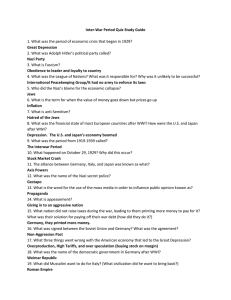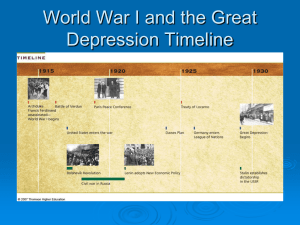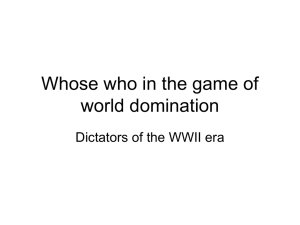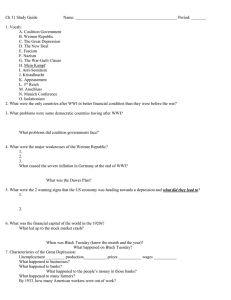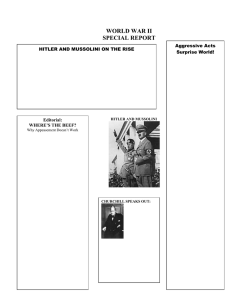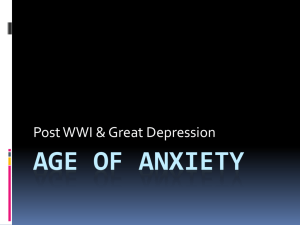BETWEEN WORLD WARS
advertisement
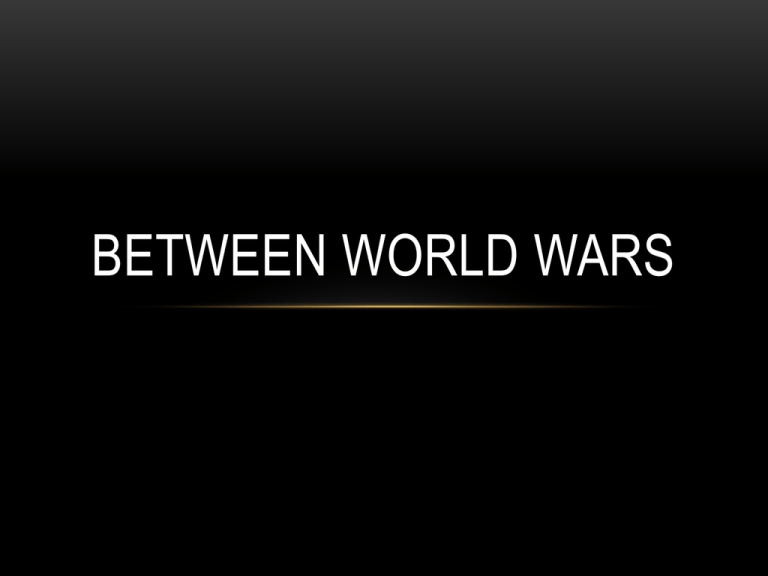
BETWEEN WORLD WARS VOCABULARY On margin Using credit to purchase stocks. Calling the loan To demand repayment of a loan in full. Stock Market Crash A time when stock prices fell, or crashed, at record rates. Recession A time of economic slowdown. Depression A period of very low economic activity combined with high unemployment. Tariff Taxes on imports New Deal FDR’s plan for economic recovery, including public works projects to increase employment and government regulation of banks, the stock market, and various industries. Inflation An increase in the price for goods or services. Gold Standard The amount of money in circulation is equal to the amount of gold a country possesses. EUROPE AFTER WW1 • European nations are faced with the massive expenses of rebuilding after WW1. • Soldiers returning for war were looking for work (high unemployment rate). • Germany is in heavy debt because of the war reparations repayment; loses its territory in the Ruhr Valley to France which was where much of its industries were located. • Germany begins printing money which devalues money all through Europe. • Europeans stop buying from Americans. U.S. AFTER WWI • After World War 1, U.S. is thriving economically because: • No battles fought in the U.S. • Fewer casualties because of our late entry to war • Good economy due to manufacturing allowed us to loan money to Western European countries after the war. • Growth in manufacturing after the war due to the new inventions: ex. Radio, automobiles, vacuum cleaner, refrigerator. • Americans purchase these new items using credit (on margin). UNDERLYING CAUSES OF THE GREAT DEPRESSION • 1. Farming prices fell due to oversupply of crops. • 2. Made bad loans to European countries who could not repay them; Europeans stop buying American products. • 3. Wealthiest Americans were driving stock market prices higher and higher, well above what something was actually worth. • 4. Ordinary Americans bought stocks on “margin” (credit) hoping to get rich. STOCK MARKET CRASH OF 1929 • a.k.a. Black Tuesday: October 29, 1929 • Stocks started to drop, so investors began selling all of their stocks. • Stocks lost between $10-15 billion in value that day. EFFECTS of the Stock Market Crash: 1. Banks closed – “Runs on the bank” emptied out all the money banks held as people went to withdraw their money from the banks. 2. Businesses failed = job loss 3. Individuals lost their savings = lost homes and land because banks were demanding loans be repaid in full (leads to Hoovervilles) 4. Dust bowl (major drought) causes farms to fail = widespread hunger WORLDWIDE EFFECTS OF THE U.S. DEPRESSION • Western Europe is struggling financially after WWI to rebuild. • The U.S. makes loans to many European nations to help them rebuild. In addition, the U.S. loaned Germany money to help pay the war reparations. • As the U.S. economy worsened, U.S. investors demanded payment of the loans and stopped loaning any new funds. This crippled the economies of the European nations. • World-wide trade began to suffer, so the depression spread around the world. GLOBAL RESPONSE TO THE DEPRESSION • Most nations turned inward and became isolationist in order to solve their own economic problems. • Democratic nations (U.S., Great Britain) – the governments worked to pass laws to improve economic conditions. • Other nations turned to totalitarian leaders (Germany, Italy) who used their powers to begin imperializing to gain raw materials and markets to help boost their economy. U.S. RECOVERY • Franklin Delano Roosevelt (FDR) elected president in 1932 on promises to help rebuild America. • The New Deal – focused on public works projects to increase employment and government regulations on banks, the stock market, industry and farming production. a. Created the Social Security Act b. Created public works projects that built dams, highways, and bridges around the country. • The first time government creates assistance programs in the United States. BRITISH RECOVERY • Enacted protectionist policies (policies designed to protect domestic industries and services from foreign competition). • Included dropping the gold standard • Increase government ownership/management of key industries • Raised taxes to loan money to new businesses in the hopes of increasing employment. RESPONSE TO THE DEPRESSION IN EUROPE • Great Britain: raised taxes, balanced the budget, and controlled spending • France: Radical political party called the Popular Front takes over. They started an aid program called the French New Deal, but it didn’t work • Germany: created the Weimar Republic (they renamed Germany to reflect a new democratic government). Germany had problems of high unemployment, bankrupt middle class, and major inflation (prices on goods rise because money is worth less – the idea of “just print more money.” Gives the opportunity for radical groups such as the Nazi party to participate in politics. CHANGES IN GOVERNMENTS • Totalitarian governments take over Europe!!! (When leaders control every aspect of your life…) • Fascism – a form of government that is nationalistic to the extreme. War is glorified. The government has total control of your life, and is led by a dictator or a small group of people. Fascism allows individuals to have private property and allows for class system (lower, middle, upper) Ex. Italy, Germany • Communism – a form of government where a dictator or small group of people control every aspect of your life. Under communism, there are no social classes (everyone is equal) and you are not allowed to own private property. Ex. Soviet Union, China THE RISE OF HITLER • Germany owed the Allies $33 billion dollars. • Began printing money (ex. Before the war, 4 marks = $1, after 4 trillion marks = $1) • Hitler joins the Nazi Party (National Socialist German Workers’ Party) in 1919, takes control of the Party by 1921. • After a failed attempt to start a revolution, he is thrown into jail. He writes Mein Kampf (My Struggle): he blames the Jews and the Communists for the loss of WWI, says the Germans (Aryans) are a “master race.” THE RISE OF HITLER • Hitler’s ideas begin to become popular and the Nazi’s take over the government. • Hitler forces the German President to name him Chancellor of Germany. • Hitler banned freedom of speech, religion, assembly, and the press. • Passed the Nuremburg Laws: barred Jews from schools, owning businesses, holding government office, and force the Jews to wear the yellow stars. Encouraged anti-semitism (anti-Jewish feelings). THE RISE OF STALIN • Became the leader of the Communist Party in 1928. • Country began to industrialize again. • Created a secret police to monitor everything said or written (terrorized the people). • Censored all sources of information, used propaganda to keep power, killed religious leaders, outlawed religion. THE RISE OF STALIN • Came up with the Five Year Plans – change the country from agricultural to industrial. • Focused on iron and steel production, so there was a shortage of regular household goods. • Started collectivization of farms: government took over all of the farms, forced the people to work them. Increased food production. • Improved the economy and education, banned religion, people had no rights. • Anyone who disagreed would be killed. THE RISE OF MUSSOLINI • Italy is angry because they didn’t get the land it was promised at the end of WWI, and their economy is in the dumps due to the war and the depression. • Benito Mussolini starts the Fascist party in 1919. Followers are the Black Shirts, and they use violence to force people to follow them. • King Victor Emmanuel III named Mussolini the Prime Minister. THE RISE OF MUSSOLINI • After a corrupt election, Mussolini names himself Il Duce, “The Leader” • Banned all other political parties • Killed anyone who disagreed with Fascism • Stopped Communism from spreading to Italy • Decreased unemployment by increasing the military JAPAN • Japan is a major manufacturing center after WWI. • Population increases cause food shortages, on top of the effects of the depression (job loss, low wages) • The military blames the government for becoming too “Western.” • Look for new markets to sell their products to and get resources from. • The military takes over the government (militarism), invades Manchuria in 1931, attack China in 1937. • Hideki Tojo (military general) runs the nation – wants to create a Japanese Empire in Asia. Spain • 1936, General Francisco Franco led a military revolt against the government. • Caused a bloody Civil War. • Hitler and Mussolini helped Franco (Germany gave him new weapons to test). • The U.S. and other countries tried to help the government. • Franco became dictator when the civil war ended in 1939.
